Best Antidetect Browsers for 2025

Explore the best antidetect browsers for 2025, including Multilogin, AdsPower, GoLogin, Kameleo, and Linken Sphere, for secure multi‑account management and privacy protection. Compare features, pricing, and automation support to choose the right stealth browser for your business needs.
What Is an Antidetect Browser?
Stealth browsers, often called antidetect or anti detective browsers, are tools built for online privacy and multi‑account management. Unlike Chrome or Firefox, which leave behind a fairly unique “fingerprint,” an antidetect browser can mask or swap those fingerprints so websites can’t easily identify you.
Here’s the simple idea:
- Incognito mode only hides your history locally.
- VPNs only change your IP address.
- Antidetect browsers go much deeper—they also cover details like device model, operating system, fonts, canvas, WebRTC, and even time zones.
The effect is powerful: every profile you create inside an antidetect browser behaves like a completely separate computer, with no link to your other accounts.
That’s why these tools have become trusted by e‑commerce sellers, ad buyers, researchers, and privacy enthusiasts. They provide the kind of security and flexibility that a regular browser alone simply can’t.
Do You Really Need an Antidetect Browser?
If you’re hearing about antidetect browsers for the first time, it’s normal to wonder: “Do I actually need one?” The answer depends on how you use the internet. Let’s break it down by asking a few key questions:
- Do I manage multiple accounts?
If you run more than one online store, ad account, or social profile, chances are your regular browser isn’t enough. Platforms like Amazon or Facebook can quickly flag accounts when they see the same device fingerprint.
👉 An antidetect browser lets you create separate, isolated profiles, each acting as a new device.
- Is online privacy a top priority for me?
Even if you’re not an e‑commerce seller, you might still care about your digital footprint. According to Statista, there are 5+ billion internet users, and companies are constantly tracking behavior for ads.
👉 If you want to reduce tracking far beyond what incognito mode or VPNs can do, an antidetect browser provides that extra layer of protection.
- Will I use it alone, or with a team?
- Solo users: Start simple—tools like GoLogin offer affordable plans with enough profiles for freelancers.
- Teams and agencies: Consider platforms with collaboration features such as AdsPower, which allow account sharing without risking bans.
- How much can I spend?
Quality comes at a price. Professional tools like Multilogin or Linken Sphere are powerful, but they cost more.
👉 On the other hand, if you’re just testing the waters, some providers (like proxies with add‑on browsers) or entry‑level products can help you save money—though with fewer features.
- Do I need automation?
If you’re running marketing campaigns or scraping data, automation may be essential. Tools like Kameleo support APIs and integrate well with headless libraries (e.g., Selenium or Puppeteer).
👉 If automation isn’t on your radar, you can skip this and choose a more user‑friendly browser.
Bottom line:
- If your answer is “no” to most of these questions → a regular browser + VPN should be enough.
- If your answer is “yes” to even two or three → investing in an antidetect browser is not just smart, it’s practical.
How to Choose the Best Antidetect Browser
The antidetect browser market is crowded, but if you ask the right questions, it becomes easier to decide which tool fits your needs. Here are seven points that truly matter—and how to think about them.
- Fingerprint masking strength
The whole purpose of an antidetect browser is to convince websites you’re someone else. That goes way beyond clearing cookies. A solid browser should be able to:
- Randomize or entirely rewrite fingerprint elements like Canvas, WebGL, WebRTC leaks, audio context, and timezone.
- Keep these fingerprints consistent for each profile so your accounts don’t look suspicious.
Weak spoofing = websites can link your accounts together, which defeats the purpose. Invest in a browser known for high‑quality emulation.
- Number of profiles you can run
Your workload matters. Ask yourself: “Am I managing 5 accounts, 50 accounts, or 500?”
- Free or entry plans usually give you 5 to 10 profiles—good for testing.
- Freelancer plans often expand to 50–100 profiles.
- Team or enterprise plans can scale into the thousands.
Each profile works like a separate “virtual computer” with its own fingerprint. The more you need, the more you’ll pay. Always check the cost per profile before subscribing.
- Collaboration features
If you’re working alone, this might not matter. But for teams, collaboration is often the make‑or‑break factor. Look for browsers that allow:
- Cloud synchronization so your team members can log in from anywhere.
- Role‑based permissions to protect sensitive information (e.g., one teammate can use an account without knowing the password).
- Activity logs so admins can see who accessed what and when.
Browsers like AdsPower were built with agencies in mind, offering team dashboards and enterprise‑grade management out of the box.
- Ease of use
Not every marketer or seller wants to learn technical settings. Some antidetect browsers overload beginners with configuration options. Here’s what to keep in mind:
- Simple dashboards and setup wizards help you start quickly.
- Cloud syncing means you don’t worry about exporting/importing profiles.
- Drag‑and‑drop account import is a huge time saver if you’re migrating from spreadsheets.
If you’re new, start with something user‑friendly like GoLogin, and only move to advanced tools once you’re comfortable.
- Automation support
For agencies that scale, manual work simply doesn’t cut it. Automation is where real productivity gains happen. Advanced browsers may include or integrate with:
- APIs for programmatic control.
- Support for headless frameworks such as Selenium, Puppeteer, or Playwright.
- Profile cloning and bulk creation, so you don’t waste time setting everything up by hand.
If automation is part of your growth strategy, look at providers like Kameleo that position themselves as developer‑friendly.
- Pricing and value
The antidetect browser market spans from affordable entry plans to enterprise‑grade subscriptions. A few rules of thumb:
- Cheap or free browsers often lack strong fingerprint masking—it’s a false economy.
- Mid‑range tools like GoLogin strike a balance between usable features and price.
- Premium providers like Multilogin or Linken Sphere charge more but deliver advanced security, stability, and features.
Always ask: “What’s my cost per account managed? Is there ROI?” For many professionals, the investment pays for itself if it prevents even one ban or saves dozens of work hours.
- Cross‑platform compatibility
Finally, think about your workflow environment:
- Windows and macOS support is standard, but not every browser behaves equally well across systems.
- Some vendors offer cloud‑based browsers, letting you access profiles from any machine without transferring files.
- Mobile OS emulation can be a game‑changer if your niche relies heavily on iOS or Android behavior.
Compatibility is not just about convenience—it reduces friction when your whole team needs consistent, error‑free access.
Pro tip: Don’t chase the most popular product just because others use it. Your choice should reflect your scale, your team, and your budget. Often, starting small and upgrading later is the smarter path.
Top 5 Best Antidetect Browsers (2025 Picks)
Multilogin
Trusted market veteran
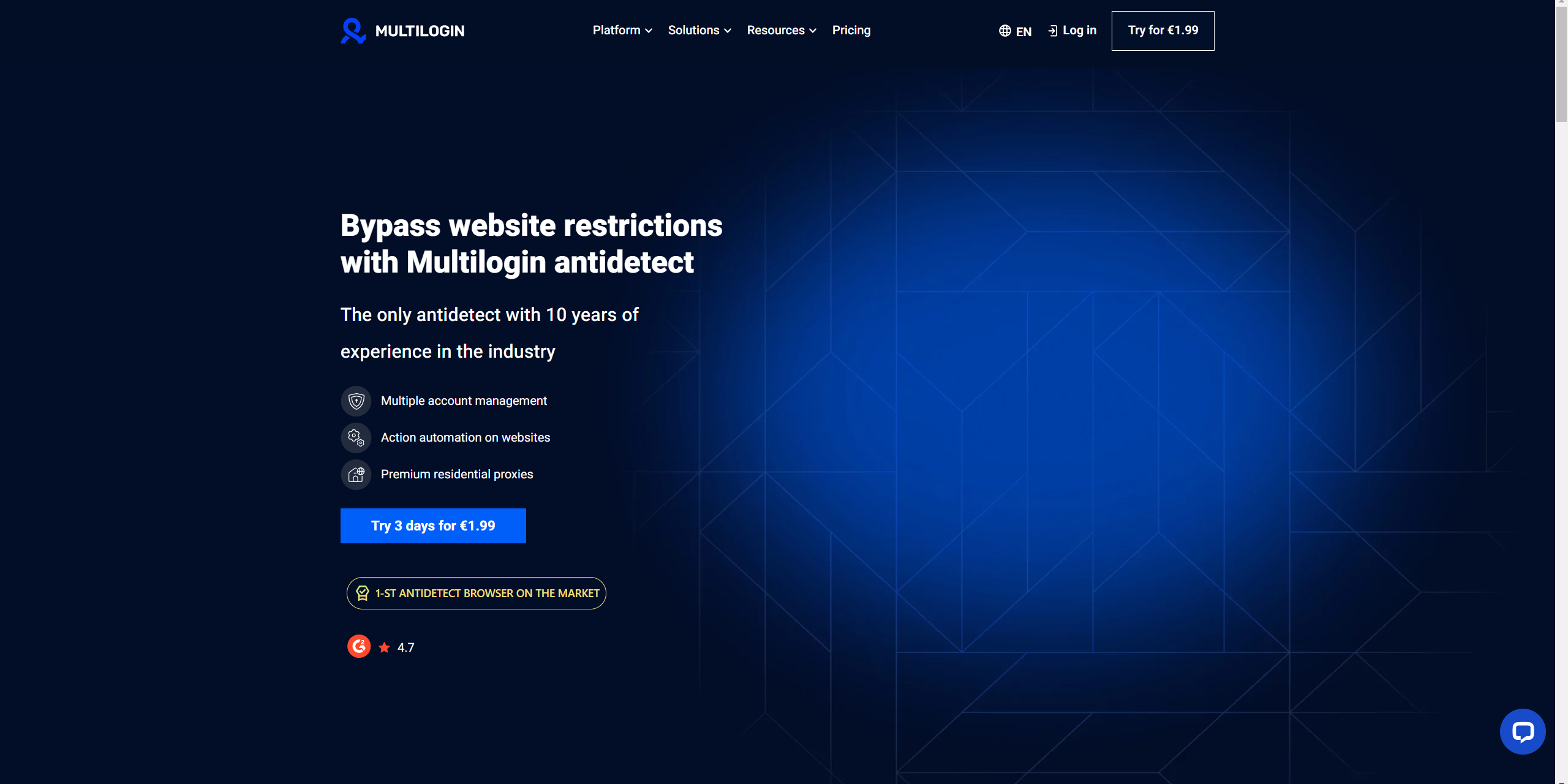
- Operating systems: Windows, Linux, macOS
- Free proxies: From 1GB of free proxy traffic
- Free plan: –
- Price: From $29/month for 10 profiles
- Trial: Contact support
If you’re serious about managing multiple accounts, Multilogin is the gold standard. This Estonian company was one of the first in the antidetect space and still sets the bar.
Unlike many tools that just disable fingerprint parameters, Multilogin fully emulates them, making it harder for platforms to detect. You can choose Chrome‑ or Firefox‑based environments, quickly spin up profiles, or dive into advanced customizations.
Multilogin data is encrypted in the cloud and supports team collaboration — up to 10 users depending on your subscription. For developers, automation with Selenium or Puppeteer is supported, allowing the creation of thousands of profiles per day.
Limitations: It’s one of the pricier antidetect browsers. Starter plans begin at $29/month for only 10 profiles, while competitors often include more. Higher‑tier plans (from $159/month) unlock extra teammates and larger proxy bundles.
AdsPower
Built for collaboration
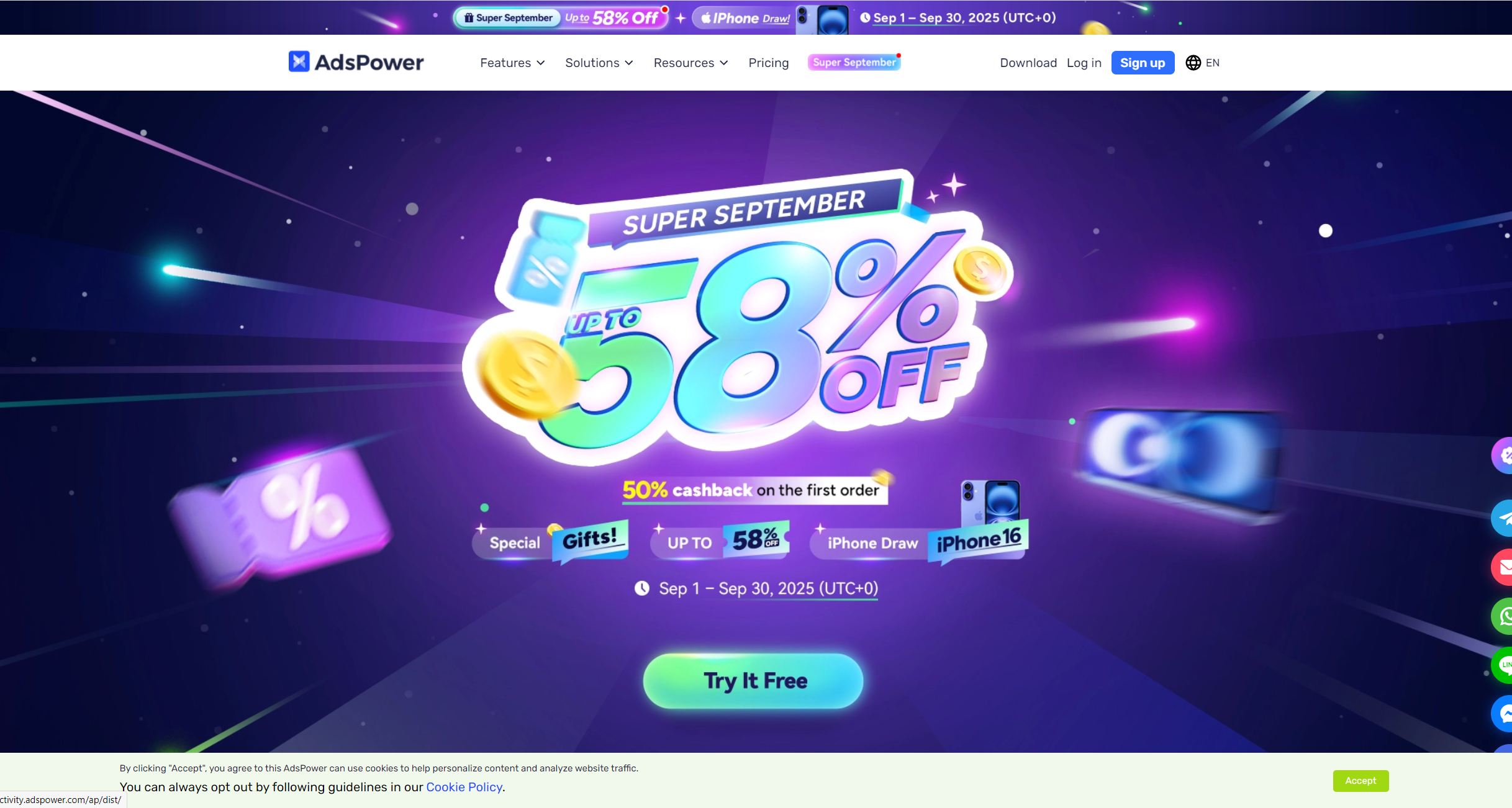
- Operating systems: Windows, macOS
- Free proxies: Integrates seamlessly with most proxy services
- Free plan: Up to 2 free browser profiles
- Price: From $9/month for 10 profiles
- Trial: Free tier available
AdsPower is the antidetect browser optimized for teams and agencies. Its standout feature is collaboration management—multiple people can share, sync, and manage accounts safely through cloud storage.
With its dashboard interface, admins can manage user roles, permissions, and even sync browsing sessions in real time. That makes AdsPower especially appealing for marketing firms or e‑commerce teams where account safety is critical.
It also integrates with automation tools for campaigns and data collection, so scaling operations is straightforward.
What to keep in mind: The dashboard can feel a bit overwhelming for beginners, and setup may take longer compared to lighter products.
GoLogin
Most beginner‑friendly option
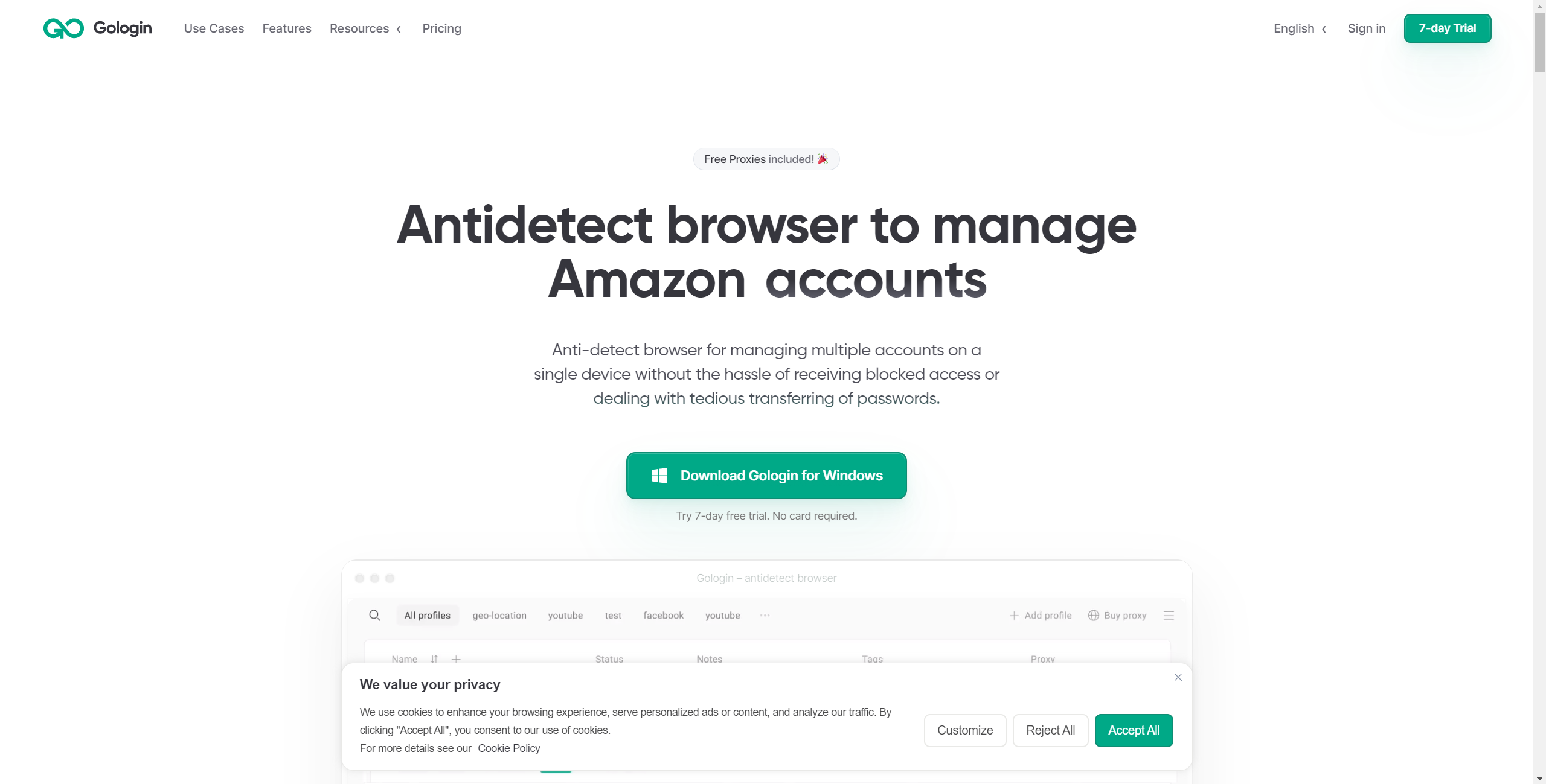
- Operating systems: Windows, macOS, Linux
- Free proxies: Proxy manager built‑in
- Free plan: 3 free browser profiles
- Price: From $24/month for 100 profiles
- Trial: 7‑day free trial
GoLogin is the antidetect browser designed for ease of use. Its clean, modern interface makes profile creation quick and intuitive—even for those completely new to antidetect technology.
With a single subscription, you get access to 100 browser profiles, way more than Multilogin’s entry plan. Every profile comes with strong fingerprint masking, cloud sync, and proxy management, so you can run campaigns or online stores without hassle.
For solo entrepreneurs, freelancers, or anyone who values simplicity, GoLogin offers a low learning curve and excellent balance of price vs. features.
Potential drawbacks: Advanced automation capabilities are lighter here. Power‑users may feel limited compared to developer‑oriented tools.
Kameleo
Developer’s choice for automation
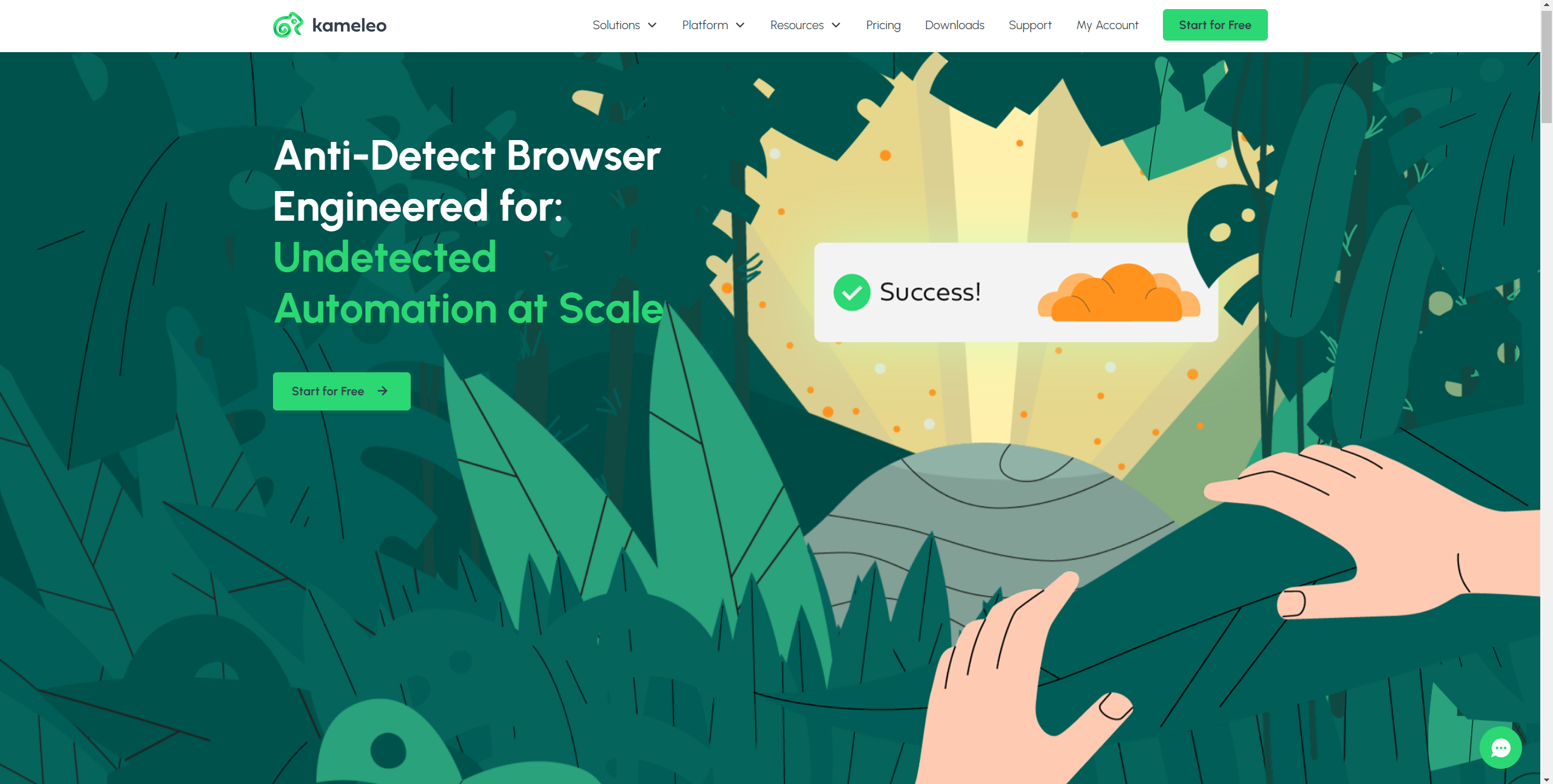
- Operating systems: Windows, Android
- Free proxies: Supports third‑party providers
- Free plan: –
- Price: From €59/month
- Trial: Free demo available
Kameleo positions itself as a developer‑friendly antidetect browser. It’s built with automation in mind, supporting Selenium, Puppeteer, and Playwright, which makes it popular for web scraping and high‑volume campaign management.
One standout? Mobile OS emulation. Kameleo allows you to simulate Android/iOS fingerprints, which is critical for industries like apps, mobile ads, or any platform that pushes mobile‑only experiences.
The platform covers all the expected basics: profile management, proxy integration, and state‑of‑the‑art fingerprint masking.
Where it falls short: The interface is not as beginner‑friendly as GoLogin, and pricing is higher. It’s clearly targeted at serious users who want flexibility and automation at scale.
Linken Sphere
The power user’s antidetect browser
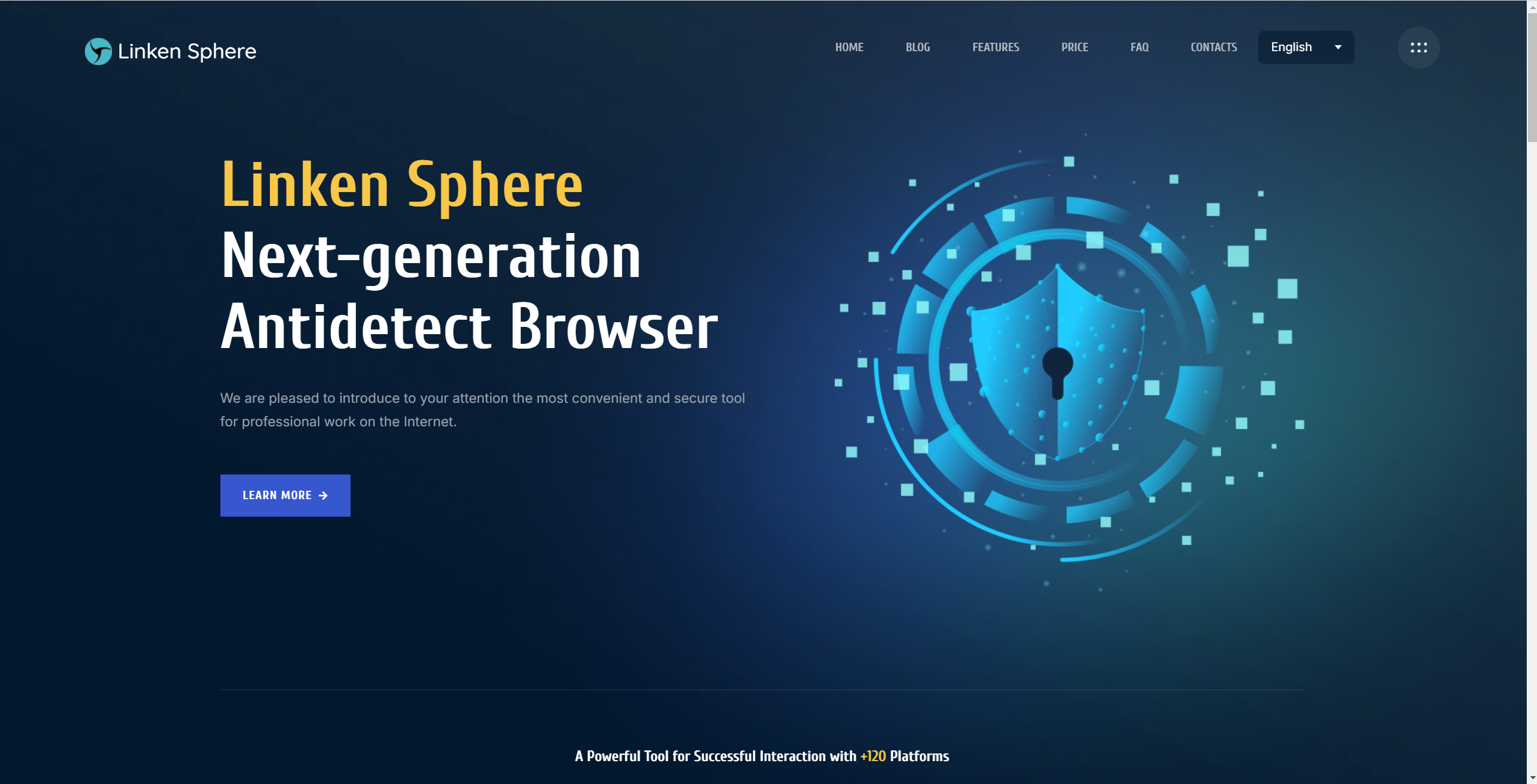
- Operating systems: Windows
- Free proxies: Supports all major providers
- Free plan: –
- Price: From $100/month
- Trial: Limited test license via support
Linken Sphere has long enjoyed a reputation as the most advanced antidetect browser for professionals. It offers deep fingerprint customization, letting experts tweak almost every system parameter. This makes it extremely powerful—but also complex.
Security is at the forefront here, with strong privacy protocols and encrypted local data storage. It’s widely used by advanced users who value full control and don’t mind a steep learning curve.
The downside: It’s expensive and less intuitive than alternatives. Linken Sphere is not designed for beginners—it’s aimed at those who already know what they need.
FAQ
Q1: Can’t I just use a regular browser with a VPN instead of an antidetect browser?
Not quite. A VPN only hides your IP address, but websites focus on device fingerprints (fonts, plugins, Canvas data, WebGL info, etc.). Even if your IP changes, your fingerprint can still connect accounts together. An antidetect browser’s main value is in re‑creating and isolating fingerprints—not just changing IPs.
Q2: I’m a beginner—where should I start?
If you only manage a few accounts or have a limited budget, start with GoLogin or AdsPower. Both are beginner‑friendly and affordable. As your workload grows or you need advanced features, you can gradually move to Multilogin or Kameleo.
Q3: How can teams safely share accounts?
Look for browsers that support multi‑user collaboration, role‑based permissions, and cloud sync. Tools like AdsPower make it possible for team members to access accounts without sharing raw passwords, reducing the risk of bans caused by geographic or device mismatches.
Q4: Are antidetect browsers legal to use?
The tools themselves are legal—the real question is how you use them. For e‑commerce operations, advertising, market research, or social media management, they’re typically fine. But if you use them to violate platform policies or local laws, you run into compliance issues. Always make sure your project is transparent and legitimate.
Conclusion
Antidetect browsers aren’t for everyone—but for multi‑account operations, e‑commerce sellers, ad agencies, and automation marketers, they’ve become essential.
- For solo beginners: start small with GoLogin or AdsPower—easy to learn, affordable, and practical.
- For teams/agencies: consider Multilogin or AdsPower, both of which excel at collaboration and scaling.
- For developers/automation pros: Kameleo and Linken Sphere provide unmatched flexibility and control.
👉 For those who also need to build automated workflows while keeping fingerprints hidden, BrowserAct is a lightweight all‑in‑one option. It combines workflow creation with antidetect privacy, making it ideal if you want to work efficiently while staying secure.
Final advice: Don’t rush to buy the most expensive plan, and avoid relying on free or weak alternatives. Start with the tool that best solves your immediate pain point, then upgrade as your business scales. That way, you’ll keep costs under control while protecting your accounts and data for the long run.

Relative Resources
Latest Resources

The 5 Best Habit Tracker Apps In 2025

Claude vs ChatGPT 2025: The Ultimate AI Showdown After Anthropic's Policy Shake-Up

Best AI Video Editing Software 2025: Free & Paid Tools Guide



